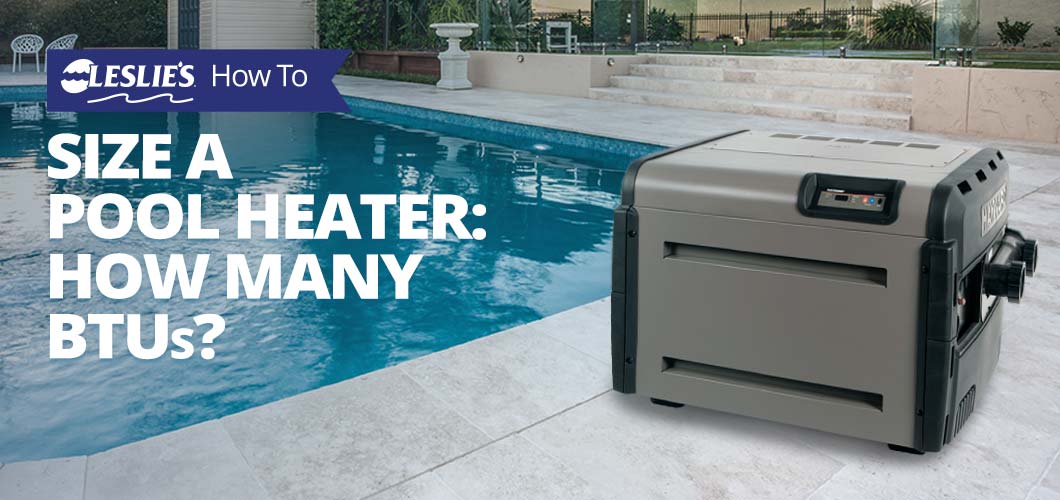
How to Size a Pool Heater: How Many BTUs?
Thinking of buying a new pool heater? Maybe you're looking to replace your current one? If so, do you know which size to get? A lot goes into choosing a heater. Important decision factors, including choosing between natural gas vs. propane, as well as determining which brand of heater has the best performance record, can have a big impact on your final choice. All other factors aside, knowing how to correctly size a pool heater is one of the best ways to ensure your pool's heating efficiency is as high as possible.
Is Bigger Really Better?

You may have heard the “bigger is better” rule of thumb about sizing pool heaters. There is some truth to it, as bigger heaters will heat a pool more quickly, and it can offer a greater temperature differential than a smaller heater would.
However, this isn’t always the case for every pool setup, and it may not be feasible for some pool owners from a budget standpoint. The important thing to remember here is that a higher BTU output may equal greater heating benefits, but it also equals more fuel used (and money spent) per hour.
Finding the Minimum Heat Output
One of the most common misconceptions is that you should size a pool heater according to a pool’s volume in gallons. While sizing according to volume isn't wrong, most of a pool’s heat is lost through evaporation at the surface, so the best way to size a pool heater is to calculate the surface area in square feet.
PRO TIP: If you're sizing a heater for a hot tub or spa, volume is more important than surface area. Hot tubs generally have warmer temperatures and a larger heater can help them heat up faster.
Calculating Pool Surface Area
Simply measure the length and width, and plug that information into one of the following equations to find the right pool heater size. Free-form or custom-shaped pools may require a bit more math and measuring. Here's how to find your pool's surface area:

Rectangular or Square Pool
Length x Width
Round or Circular Pool
3.14 × Radius2
Oval Pool
3.14 x Length x Width x 0.25
Kidney-Shaped Pool
Measure the widest point in both halves of the kidney shape to get your A and B width measurements. Then plug those measurements into the equation below:
(Width A + Width B) x Length x 0.45
Calculating Minimum BTU Requirements
Once you know the surface area, divide that number by 3, then multiply by 1,000 to get the minimum BTU rating recommended for your pool. Of course, you can always go higher than this number, but it serves as a handy “bottom line” standard to get you started in your search for a correctly sized pool heater. This minimum will typically accommodate a 25–30ºF increase in temperature. As an example, we’ll look at a 16’ x 32’ rectangular swimming pool.
16 x 32 = 512 sq. ft. surface area
512 ÷ 3 = 170.7
170.7 x 1,000 = 170,700 BTU Minimum
PRO TIP: When figuring out how many BTUs you need, it's important to also figure in the heater's efficiency. Newer pool heaters are often in the range of 82–96% efficient. For example, if you're looking at a 200,000 BTU heater with an efficiency of 85%, you could expect an actual heat output of 170,000 BTU. As a heater ages, the efficiency goes down, and a lack of regular service can make the efficiency decrease even faster.
Calculating Precise BTU Requirements

If you want to be more specific with your pool heater sizing calculations, multiply your pool’s surface area by the desired temperature differential, then multiply that number by 12. Again, we’ll look at our previous 16’ x 32’ pool as an example, planning for a maximum temperature differential of 30ºF (80ºF desired water temperature minus 50ºF ambient air temperature during the coldest month of use). This equation accounts for a 1ºF temperature increase per hour with 3.5 mph surface winds. If you want the water to heat faster, multiply your result by the rate of heat increase.
16 x 32 = 512 sq. ft. surface area
512 sq. ft. x 30º x 12 = 184,320 BTU
For a 2º per hour increase, double it: 184,320 BTU x 2 = 368,640 BTU
Varying factors like wind speed, amount of sun exposure, altitude, desired temperature increase, and the presence of a solar pool cover will all influence the effectiveness of a heater, so most people opt to purchase pool heaters that are sized at least 50k–100k BTUs higher than the recommended minimum to be on the safe side. Pool and spa combos may require a more substantial heater, depending on the volume of the hot tub itself and the desired heat-up time. In these cases, we often recommend something closer to 400,000 BTUs to accommodate your needs.
BTU Quick Reference Charts
Don't have a calculator handy? Looking for a shortcut? We've got you covered! These quick reference charts can help you quickly choose the best heater size for your swimming pool.
BTU Requirements for Natural Gas and Propane Pool Heaters
| Pool Dimensions | Surface Area | Minimum BTU |
|---|---|---|
| 14' x 28' | 392 sq. ft. | 130,700 |
| 15' x 30' | 450 sq. ft. | 150,000 |
| 16' x 32' | 512 sq. ft. | 170,700 |
| 18' x 36' | 648 sq. ft. | 216,000 |
| 20' x 40' | 800 sq. ft. | 266,700 |
| 24' x 44' | 1,056 sq. ft. | 352,000 |
Hourly Temperature Increase: BTU vs. Surface Area of Pool
| BTU | 300 sq. ft. | 400 sq. ft. | 500 sq. ft. | 600 sq. ft. | 700 sq. ft. | 800 sq. ft. | 1,000 sq. ft. |
|---|---|---|---|---|---|---|---|
| 100,000 | 1.25º | 1.0º | 0.75º | ||||
| 150,000 | 1.5º | 1.25º | 1.0º | 1.0º | 0.75º | ||
| 250,000 | 2.0º | 1.75º | 1.5º | 1.25º | 1.0º | 0.75º | |
| 350,000 | 3.0º | 2.5º | 2.0º | 1.5º | 1.25º | 1.0º | 0.75º |
| 400,000 | 3.5º | 2.75º | 2.5º | 2.0º | 1.5º | 1.25º | 1.0º |
Consider the Gas Line Size
There's one more thing to keep in mind before completing your pool heater purchase. When selecting a gas pool heater, it's important to also consider your home's current natural gas or propane setup. If a gas line is already installed, you'll need to make sure it can accommodate your chosen heater. Your choice of heater will be limited by the size of the available gas line — a larger pipe size is necessary for larger heaters with a higher BTU output.
If you need to upgrade your gas line to accommodate a larger heater, your cost of installation will go up, and you may need to get a permit to complete the job. A larger gas meter and home pressure regulator will also be required. We suggest contacting your local gas utility provider to request a field review once you've identified the heater and gas line size needed. From there, they can help with determining your next steps. Each heater manufacturer carefully details the gas piping requirements needed for optimal function, and this info can often be found online through the product page or manufacturer's website.
Maximize Your Investment with a Solar Pool Cover

No matter what size of heater you choose, most heat in pool water is lost through evaporation. Using a solar pool cover in conjunction with a gas pool heater or heat pump greatly reduces evaporation and insulates your pool surface against heat loss. As an added bonus, warmth from the sun will be transferred into the water during the day. Not only does this boost the efficiency of your pool heater, but it also saves you money in fuel expenses. If you like swimming at night, a larger pool heater will help maintain a comfortable swimming temperature while the cover is off.
Summary
The best (and easiest) way to size a new pool heater is to calculate the surface area of your pool, and use one of the previously mentioned equations to find the minimum recommended BTU output.
If you don’t use a solar cover, live in a windy area, the pool is mostly shaded, or you're looking for a larger temperature differential during the spring and fall months, you’ll want to look for a larger heater that can meet or exceed your expectations. In these cases, we suggest adding another 50–100k BTU to the minimum to ensure you get the desired performance out of your new pool heater.
Still have questions about which pool heater will work best for your pool? We can help! Call or stop by your local Leslie's today to speak with one of our pool experts about the different heating options available. You can also check out our online selection to find exactly what you're looking for.